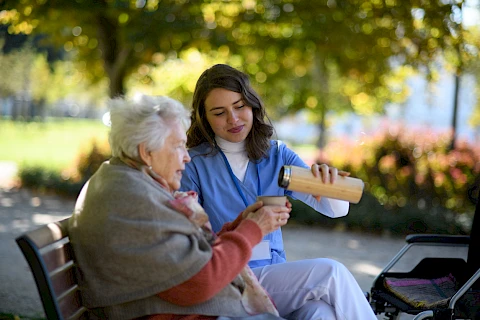
For many family caregivers, hiring professional help—whether for a short time or on an ongoing basis—can be a valuable option when caring for a senior loved one. But how do you decide what kind of care is best?
Understanding the differences between transitional care and senior care is an essential first step. We'll break down what each type of care offers, how they differ, and how they can complement each other to provide the best support for your loved one. Whether you're planning for the short term or thinking about long-term solutions, this information will help you make confident, informed decisions for the well-being of your senior loved one.
Transitional Care
Transitional care bridges the gap between a hospital setting and home care. It is a tailored service designed to help patients recover from medical events such as surgeries, severe illnesses, or other acute conditions. Transitional care aims to ensure a smooth and safe transition back to daily life.
Typical scenarios requiring transitional care include post-surgery recovery, managing a recent hospitalization, or following treatment for a severe illness. This type of care helps reduce the chances of readmission to the hospital by providing focused, temporary assistance. Key features of transitional care include medical monitoring, medication management, and coordination with healthcare providers to ensure the patient effectively follows their recovery plan.
Transitional care typically involves a higher intensity of care for a shorter duration, concentrating on recovery and rehabilitation. It also involves coordination between various healthcare professionals, such as doctors, nurses, and physical therapists.
Senior Care
Senior care provides ongoing support for elderly individuals who need help with daily activities or who manage chronic conditions. This type of care is generally more long-term and consistent, focusing on enhancing the quality of life for seniors. Senior care is beneficial when an older adult requires assistance with daily tasks like bathing, dressing, meal preparation, or mobility.
The key features of senior care include personalized assistance with day-to-day activities, companionship, and continuous monitoring of health conditions. This kind of care helps seniors maintain independence while providing the necessary support to live comfortably in their own homes.
Unlike transitional care, senior care is ongoing support primarily involving caregivers assisting with daily living activities. The focus here is not just on recovery but on providing consistent support to improve the quality of life over the long term.
How Both Care Types Can Complement Each Other
Transitional care and senior care are not mutually exclusive. Instead, they can complement each other depending on your loved one's changing needs. For instance, after a surgical procedure, your loved one might first need transitional care to aid in recovery. Once they're stable, senior care can take over to ensure they manage any chronic conditions or daily tasks they might struggle with.
A seamless care plan that smoothly transitions from one type of care to another can significantly improve your loved one's outcomes.
What Care Does Your Senior Need?
Transitional and senior care provide invaluable support for family caregivers and their loved ones. Understanding their differences—and how they can complement each other—allows you to make informed decisions.
If you're thinking about professional caregiving services, contact us. At Senior Helpers Cerritos - La Palma - La Mirada, we offer tailored care solutions to families in Artesia, Cerritos, Buena Park, La Palma, and Lakewood. Learn how we can help your loved one thrive at home.